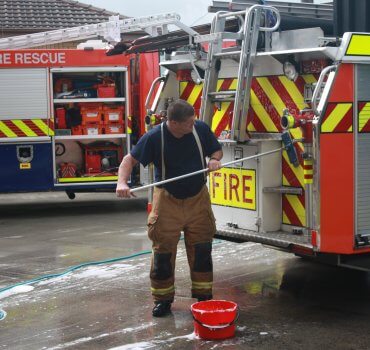
Cambridge News editor Claire Castle spent a week over Guy Fawkes attached to a pager, on call with the Cambridge volunteer fire brigade. This is what happened…
I convinced chief fire officer Don Gerrand to let me tag along with the volunteer fire brigade for a week to see what being a “volly” was like, first-hand. I had only just got the pager when it went off, accompanied by the familiar wail of the “air-raid” siren.

Once a month the volunteers give the station a thorough clean inside and out.
I must admit I’ve never been a huge fan of the siren, mounted on the Town Hall since around 1904, and I was keen to find out if it was really necessary in this day and age. Turns out it is – Don said that sometimes the pagers and text alerts don’t go off, and the guys have turned up at the station solely after hearing the siren. Good to know, and I would like to formally retract my letter to the editor of 2008 complaining about it – I was a sleep-deprived new mother, and I take it all back.
The Cambridge News office is just around the corner from the station, so I made it onto the first truck. I even ran. (Nobody said there would be running). Hurtling through town in the fire truck was super-exciting, even though it was a false alarm.
The next night, there were three callouts. I’d only just fallen asleep when the pager went off the first time. The first truck is normally out the door within three minutes, so I was never going to make that one from home. Turns out, there was only one truck sent out – it was some books on fire at the Cambridge Book Exchange.
There was a bit of milling around at the station and then back home to bed. It’s not easy to get back to sleep after all that adrenaline, and I’d only just drifted off when the pager went off again just after 3am. This time, I had slept in my clothes, so I was faster out the door. Still not fast enough to get onto the second truck, so we went out in the support vehicle.
A heater was smouldering at Lifecare rest home. Not a spectacular callout, but it could have been much, much worse. So, it was back to the station for a cuppa and chat with the guys before heading home again, until a horse tangled in a fence at Mystery Creek got everyone scrambling back to the station at 7.30am.
Seriously, by that stage I was utterly frazzled, and as I jumped out of the car and ran into the station, all of my EFTPOS cards all fell out onto the grass. Luckily, we live in Cambridge, so they were still there when I got back.
Some of the guys were dressed in their neatly-pressed fire shirts and pants, heading up town to spend the rest of the morning selling the brigade’s Christmas raffle tickets on the main street. I went home to bed. I was a wreck. It was like being a new parent only with more sirens – I was over it and it was only day two.
All was quiet again – there are weeks when it is all go – with no callouts on Saturday or Sunday nights, which was a godsend. Especially since it was Guy Fawkes, I thought the pager would be running red-hot, but there were no fireworks-related emergencies to attend.
Likewise, there were no fatal car accidents or other traumatic scenes to witness, and I was grateful for that. Apparently, the last reporter who tried to do this a few years ago lasted a day – a couple of fatal car accidents had her rethinking the whole thing and deciding against it. I can’t say I blame her.

Fire trucks are washed down after each callout, keeping them in pristine condition.
Don, a volunteer like the rest of the 24 firefighters on the books, runs a tight ship. At the helm for 23 years, he’s Cambridge’s longest-serving fire chief. After each callout, even if it’s just up the road, the trucks are hosed down and dried. “It’s automatic, they (the volunteers) just do it,” he said. Not every station has this protocol, but it’s important to him that the gear is in tip-top condition and a good reflection on the Fire Service.
He’s seen a lot of changes since he signed up in 1968, when there were just 5000 people in Cambridge. “It was easier to get volunteers back then,” he said, adding that these days it can be tough to get people who both live and work in the town. Daytime coverage is their biggest issue, Don explained, and they have had to reject around 12 good candidates from other brigades who have moved into the area over the past five years because they work out of town. It’s a shame, but there’s no point stacking the roster with people who can’t turn out during the day, he said.
Potential recruits need to have a medical test to rule out underlying conditions that would make them unsuitable, but there’s no timed obstacle courses or physical fitness requirement to meet. From there, applications are discussed at a group meeting. Everyone knows someone who knows someone, so there’s normally some insight into the applicants from around the table. And it works. They seem to be a tight unit.
The 24 volunteers on the roster are all men, for no other reason than women who have applied haven’t met the eligibility criteria, Don said. Working out of town, or living way out in the country – both deal-breakers. And it’s getting harder to find bosses who are happy to go along with the initiative that can see their staff down-tools and rush off, sometimes for hours, multiple times a day. The brigade couldn’t run without those businesses that support it, Don said. Likewise, the support of partners and families is crucial, he added, and I can imagine it would be next to impossible without their understanding. Not much fun having a nice family meal when dad suddenly bolts from the table and rushes out the door, and there’s no doubt that plenty of dinners have gone uneaten as duty called. Volunteering in the brigade requires the patience and buy-in of the whole family unit.

Even Cambridge’s longest-serving fire chief, Don Gerrand, is a volunteer.
Recruiting, training and retaining “vollys” is a reality for every small-town brigade in New Zealand – Don said that there are around 2000 paid firefighters in New Zealand, with the balance of around 14000 made up of volunteers. It’s vital for the town, because without them there would be no brigade.
Some of the guys have even moved into the middle of town, living as close to the fire station as they can get so they can make it onto the trucks. Don himself lives a minute or two from the station, and from personal experience I would say this would be essential. Over in Leamington, I was one of the furthest away from the station, and I felt as though I was going to have a nervous breakdown navigating the traffic to get to the station in time.
Traffic has definitely become more of an issue as Cambridge has grown, Don said. And more people seem to be driving along oblivious to their surroundings, not getting out of the way of emergency services on their way to a callout. I saw this first hand a couple of times, cars stubbornly crawling along despite horns and sirens right behind them. It’s frustrating and could cost people’s lives.
Every time there’s a callout, the volunteers have 30 minutes to get to the station to check in, and their names are ticked off in a book. Too many ‘no shows’ and there will need to be a conversation. Likewise, attendance at the monthly station clean and tidy is expected, as well as turning up to training and meetings. Availability is crucial, and Don said in all the years he’s been involved they have never failed to put a truck out. It’s been pretty tight sometimes – Christmas can be an issue – but there have always been the required crew of four to get the truck out the door.
Recent changes to legislation have renamed the service to Fire and Emergency, and Don said quite a few of the callouts they attend now are medical emergencies such as heart attacks. It’s also given them a mandate to give medical assistance at car crashes, something they were doing anyway. None of them seem to be the kind of people who would stand back when somebody needed help – that’s not the sort of person who joins the volunteer fire brigade. They want to help.
Former panel beater Don explained that the trades are a great source of recruits – they are practical, and know how to do a lot of things in emergency situations. They don’t mind doing what needs to be done, and thank goodness for that. Cambridge would be in real trouble without them.
So, the next time you hear the siren, just remember that while it’s annoying and may have even woken you up, at least you don’t have to leap out of bed and hurtle down the road to possible carnage and mayhem. Because that is no fun whatsoever. I was glad to hand the pager back.
The brigade couldn’t operate without the support of these businesses:
- Cambridge Glass
- Cambridge Hire Centre
- Cross Electrical
- Dave Stroobant Building Ltd
- Fonterra
- Lewis Law
- Mag-Fix Cambridge
- McCanns Mowing
- NZ Police
- PGG Wrightson
- Shaws Wire Ropes
- St John Ambulance
- Steen and Morrow
- Van Dykes Flooring Xtra
- Wilkinson Transport Engineers








